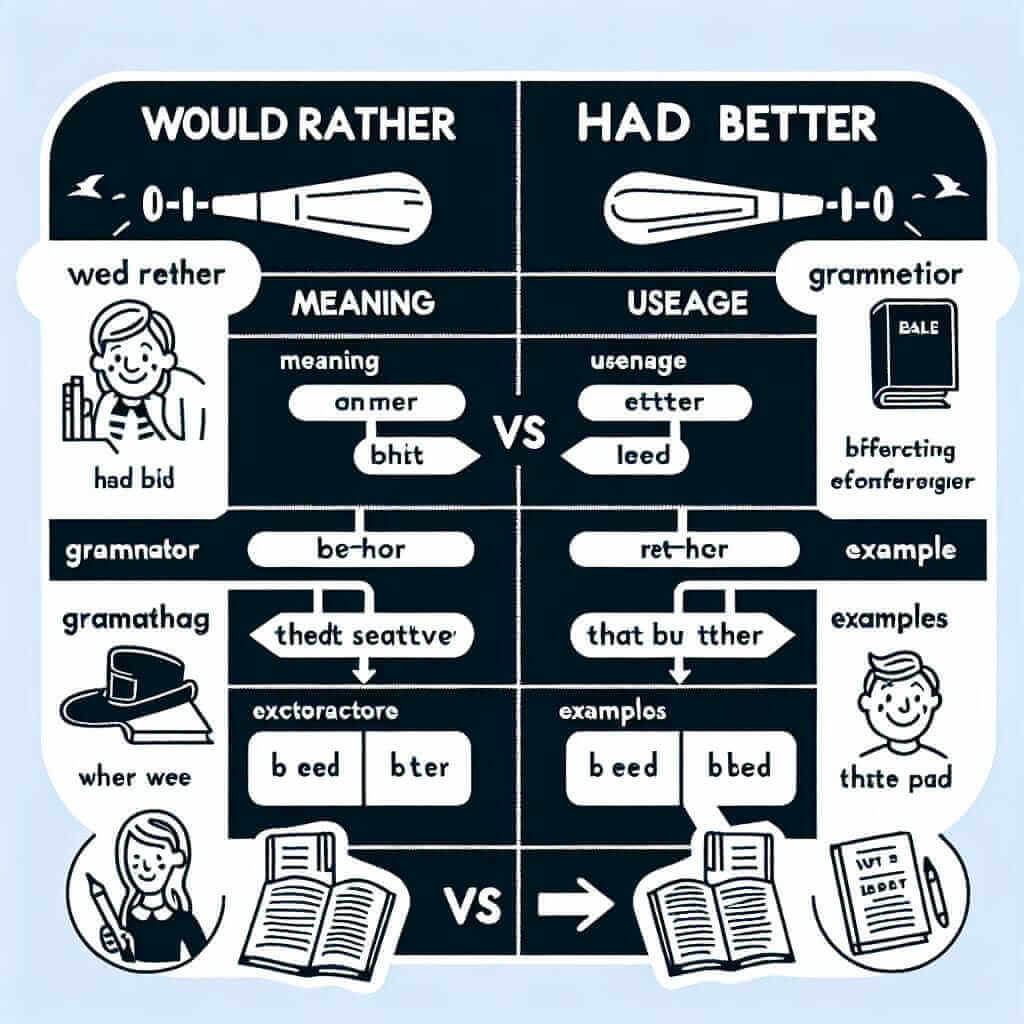“Would rather” and “had better” are two common modal verb phrases in English, often causing confusion for IELTS test-takers. Mastering them can significantly enhance your speaking score, particularly in scenarios requiring polite suggestions or strong advice. This article provides a comprehensive guide to understanding and confidently using these phrases in your IELTS Speaking exam.
Nội dung bài viết
For instance, consider these situations and how these phrases fit:
- Situation 1: Your friend is considering a risky investment.
- Strong advice: “You had better do thorough research before investing.”
- Situation 2: You’re deciding on dinner plans with a friend.
- Polite suggestion: “Would you rather order pizza or make pasta tonight?”
- Situation 3: You’re offering travel tips to a friend.
- Polite suggestion: “If you’re going to Italy, you might rather learn a few basic Italian phrases.”
In each example, the phrases convey different levels of urgency and formality, showcasing their versatility in communication. Let’s delve deeper into their usage and application.
Understanding “Would Rather”
Meaning and Usage:
“Would rather” expresses a preference, indicating what someone would prefer to do. It’s generally used for polite suggestions and expressing personal choices.
Grammatical Structure:
Subject + would rather + base form of verb (+ than + base form of verb)
Examples:
- I would rather stay home tonight than go to the cinema.
- Would you rather have coffee or tea?
Analysis:
- The first example illustrates a clear preference for staying home over going out.
- The second example presents two options, highlighting the use of “would rather” for making choices.
Application in IELTS Speaking:
“Would rather” is particularly useful in Part 1 and Part 3 of the IELTS Speaking test:
Part 1:
- Examiner: What do you like to do in your free time?
- You: Well, I would rather read a book than watch TV. It’s more relaxing.
Part 3:
- Examiner: Do you think young people today are more independent than previous generations?
- You: It’s difficult to say, but many young people today would rather travel and explore the world than settle down immediately after finishing their studies.
Mastering “Had Better”
Meaning and Usage:
“Had better” is used to give strong advice or warnings, often implying negative consequences if the advice is not followed. It carries a stronger sense of urgency than “should” or “ought to.”
Grammatical Structure:
Subject + had better + base form of verb
Examples:
- You had better leave now if you want to catch the last train.
- She had better study hard, or she might fail the exam.
Analysis:
- The first example implies that missing the train would be undesirable.
- The second example warns of the potential consequence (failing the exam) if the advice (studying hard) is ignored.
Application in IELTS Speaking:
“Had better” is less common in casual conversation but can be used effectively in Part 3 discussions:
Part 3:
- Examiner: What are some challenges faced by people living in megacities?
- You: One major issue is pollution. I think city planners had better invest in sustainable transportation solutions to combat this problem effectively.

Common Mistakes and How to Avoid Them:
- Incorrect tense: Remember that both “would rather” and “had better” are followed by the base form of the verb, regardless of the tense.
- Incorrect: I would rather went to the beach.
- Correct: I would rather go to the beach.
- Using “would rather” for strong advice: “Would rather” is about preference, not obligation. Use “had better” for strong advice.
- Incorrect: You would rather study for your exams.
- Correct: You had better study for your exams.
- Overusing “had better”: While useful, “had better” can sound too direct or even aggressive in some contexts. Use it judiciously.
Conclusion:
By understanding the subtle differences between “would rather” and “had better,” you can express yourself with greater nuance and accuracy in the IELTS Speaking exam. Remember to use “would rather” for preferences and “had better” for strong advice, paying attention to the correct grammatical structure and context.